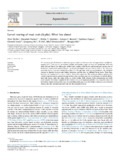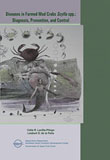Perlihatkan publikasi sederhana
Enhancing mud crab population through mangrove restoration
| dc.contributor.author | Lebata-Ramos, Ma. Junemie Hazel | |
| dc.contributor.author | Doyola-Solis, Ellen Flor | |
| dc.contributor.author | Sibonga, Rema | |
| dc.contributor.author | Biñas, Joseph B. | |
| dc.contributor.author | Walton, Mark | |
| dc.contributor.author | Le Vay, Lewis | |
| dc.contributor.editor | Quinitio, Emilia T. | |
| dc.contributor.editor | Parado-Estepa, Fe Dolores | |
| dc.contributor.editor | Coloso, Relicardo M. | |
| dc.date.accessioned | 2017-08-25T09:10:35Z | |
| dc.date.accessioned | 2017-08-25T16:35:28Z | |
| dc.date.available | 2017-08-25T09:10:35Z | |
| dc.date.available | 2017-08-25T16:35:28Z | |
| dc.date.issued | 2017 | |
| dc.identifier.citation | Lebata-Ramos, M. J. H., Doyola-Solis, E. F., Sibonga, R. C., Biñas, J. B., Walton, M., & Le Vay, L. (2017). Enhancing mud crab population through mangrove restoration. In E. T. Quinitio, F. D. Parado-Estepa, & R. M. Coloso (Eds.), Philippines : In the forefront of the mud crab industry development : proceedings of the 1st National Mud Crab Congress, 16-18 November 2015, Iloilo City, Philippines (p. 158). Tigbauan, Iloilo, Philippines: Aquaculture Department, Southeast Asian Fisheries Development Center. | en |
| dc.identifier.isbn | 9789719931072 | |
| dc.identifier.uri | http://hdl.handle.net/10862/3194 | |
| dc.description | Abstract only. | en |
| dc.description.abstract | Mangroves are known as important nurseries for different species of fish and shellfish. In the Philippines, mud crabs Scylla spp. are among the most valuable crustaceans harvested from the mangroves and are considered a delicacy. However, varying levels of overfishing have been reported in different parts of the country. The decrease in production may be due to increasing demand for the resource and the loss of mangrove habitat. This problem may be addressed through regulation of fishing effort, rehabilitation of habitats, mangrove-friendly aquaculture and enhancement of wild crab stocks. This study shows the effect of mangrove rehabilitation on mud crab population. From July 2010 to December 2011, a total of 2.166 tons of mud crabs (n=17,558) have been collected from a 66.5 ha abandoned pond that has been recolonized by mangroves. The catch was dominated by S. olivacea (79.96%), then S. tranquebarica (19.92%) and S. serrata (0.12%). Male to female ratio was at 1.09:1. Individual daily yield ranged from 0.06 to 8.4 kg while catch per unit effort in terms of quantity and biomass ranged 0.02-1.46 crab gear-1 day-1 and 1.1-213.54 g gear-1 day-1, respectively. The results showed that mud crab population in this study site was much higher than the population in the reforested (Walton et al., 2006, 2007) and natural mangroves (Lebata et al., 2007) with almost the same area. For 18 months of sampling (April 2002-September 2003), only 3,924 crabs were sampled in the natural mangroves while 10,504 in the reforested mangroves. Mud crab production in the present study site resulted in a yield of 21 kg ha-1 yr-1, 5 and 3 times higher than the yield reported in the natural and reforested mangrove areas, respectively. These results imply that habitat restoration can be very effective in restoring natural populations of mud crab. | en |
| dc.language.iso | en | en |
| dc.publisher | Aquaculture Department, Southeast Asian Fisheries Development Center | en |
| dc.subject | Scylla olivacea | en |
| dc.subject | Scylla serrata | en |
| dc.subject | Scylla tranquebarica | en |
| dc.subject | Philippines | en |
| dc.title | Enhancing mud crab population through mangrove restoration | en |
| dc.type | Conference paper | en |
| dc.citation.spage | 158 | |
| dc.citation.conferenceTitle | Philippines : In the forefront of the mud crab industry development : proceedings of the 1st National Mud Crab Congress, 16-18 November 2015, Iloilo City, Philippines | en |
| dc.subject.asfa | commercial species | en |
| dc.subject.asfa | habitat loss | en |
| dc.subject.asfa | habitat improvement (biological) | en |
| dc.subject.asfa | mangrove swamps | en |
| dc.subject.asfa | marine crustaceans | en |
| dc.subject.asfa | nursery grounds | en |
| dc.subject.asfa | overfishing | en |
| dc.subject.asfa | population number | en |
| dc.subject.asfa | resource conservation | en |
| dc.subject.asfa | resource management | en |
| dc.subject.asfa | stock assessment | en |
| dc.subject.scientificName | Scylla serrata | en |
Files in this item
Publikasi ini ada di koleksi berikut
-
Philippines : In the forefront of the mud crab industry development [44]
Proceedings of the 1st National Mud Crab Congress





